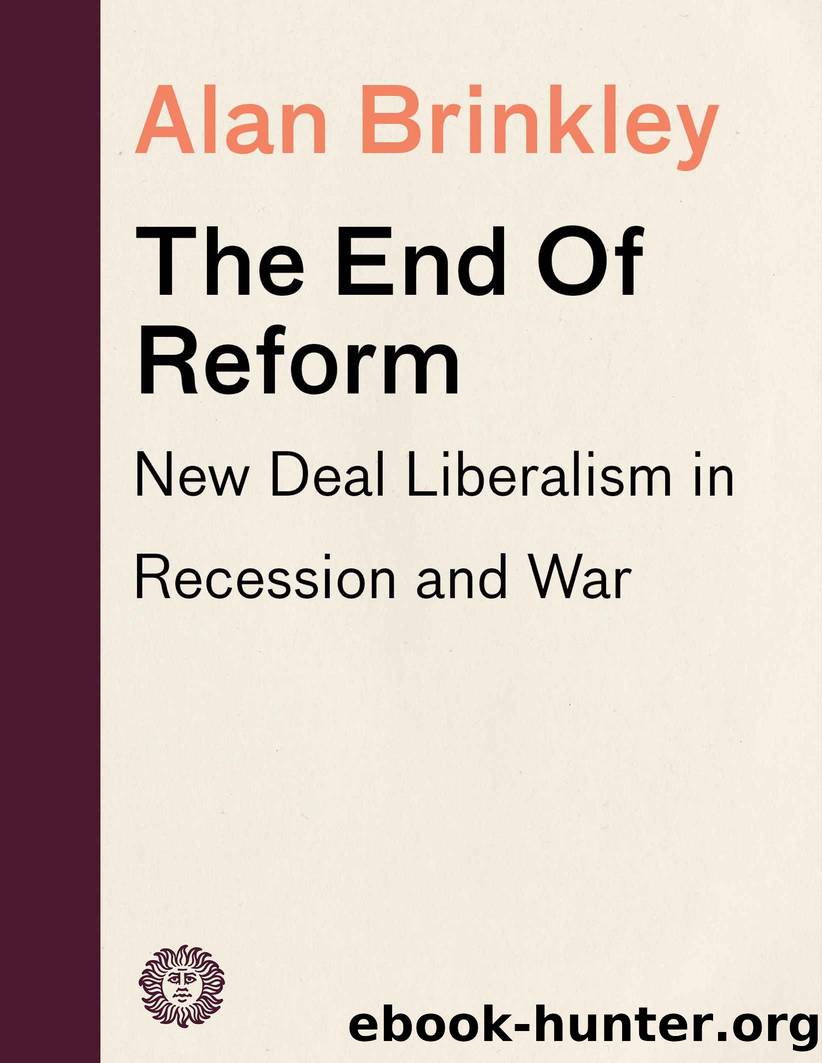The End Of Reform by Alan Brinkley

Author:Alan Brinkley [Brinkley, Alan]
Language: eng
Format: azw3
Publisher: Knopf Doubleday Publishing Group
Published: 2011-09-20T16:00:00+00:00
NELSONâS CRITICS were not mollified. As I. F. Stone noted, even if Nelsonâs forces were able to prevail over the military, which was far from certain, âthey still have a long way to go.â For they faced as well another battleâa battle that, to most liberals at least, was at least as important as, and closely related to, the conflict with the armed forces. Nelson and his allies would have to stand up against the conservative corporate figures who were flooding into the war agencies and threatening, many liberals feared, to turn them into agents of monopoly.36
In 1939 and early 1940, when preparation for war was still largely theoretical, most liberals within the administration (and many outside it) lobbied for a mobilization plan that would make use of the established institutions of the federal government. The Commerce Department, for example, might manage industrial mobilization; the Labor Department would handle labor problems. Each department would bring in advisers and subordinates from the business world, but the regular officers of government would largely dominate the process. That would ensure a war effort managed by people committed to New Deal principles. It would also guarantee that the state itself, not an improvised hybrid, would control the war economy. In the process, many liberals hoped, the state would legitimize and expand its role as an effective instrument for planning and regulation. Roosevelt, in short, should not organize the economy according to the World War I model; he should not, Harold Ickes warned in 1939, âallow the fat cats of Wall Street to run the war activities.â37
In the end, of course, the mobilization did follow the World War I model. That was partly a result of bureaucratic necessityâof the lack of capacity and experience within the existing departments for the vast responsibilities mobilization would have imposed on them. But it was also a deliberate political choice. Roosevelt feared that entrusting the war economy to existing agencies would create damaging partisan divisions; and he believed that businessmen would respond more readily to direction from other businessmen than to orders from what they considered a hostile federal government. The result was a collection of war bureaucracies most of which were state agencies only in name. Indeed, some liberals looked on them not as agencies of government at all, but as the malign arms of monopoly capital, staffed by people less loyal to the needs of the nation than to the needs of their own industries. From the first days of the war mobilization to the last, the most pervasive liberal criticism of the process rested on the power of âmonopolistsâ within it.38
Business executives assumed positions within the WPB and other war agencies in several different ways. Some (Nelson among them) resigned from their firms and took salaried government positions, which almost always meant a substantial reduction in income. Others took temporary (often paid) leaves from their companies and worked in Washington as, in effect, volunteers, without any official appointment or salary; they were known as âWOCs,â people working âwithout compensation.
Download
This site does not store any files on its server. We only index and link to content provided by other sites. Please contact the content providers to delete copyright contents if any and email us, we'll remove relevant links or contents immediately.
The Lost Art of Listening by Michael P. Nichols(7506)
Why I Am Not A Calvinist by Dr. Peter S. Ruckman(4153)
The Rosicrucians by Christopher McIntosh(3521)
Wicca: a guide for the solitary practitioner by Scott Cunningham(3179)
Signature in the Cell: DNA and the Evidence for Intelligent Design by Stephen C. Meyer(3138)
Real Sex by Lauren F. Winner(3023)
The Holy Spirit by Billy Graham(2953)
To Light a Sacred Flame by Silver RavenWolf(2823)
The End of Faith by Sam Harris(2742)
The Gnostic Gospels by Pagels Elaine(2531)
Waking Up by Sam Harris(2461)
Nine Parts of Desire by Geraldine Brooks(2369)
Jesus by Paul Johnson(2363)
Devil, The by Almond Philip C(2333)
The God delusion by Richard Dawkins(2309)
Heavens on Earth by Michael Shermer(2285)
Kundalini by Gopi Krishna(2185)
Chosen by God by R. C. Sproul(2165)
The Nature of Consciousness by Rupert Spira(2108)
